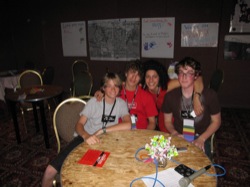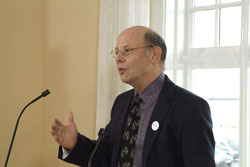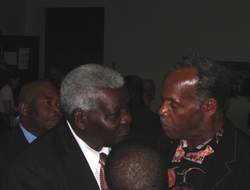Uncategorized

For a $50.00 gift, you’ll receive the book, The Emerging Police State, William M. Kunstler. Edited by Michael Steven Smith, Karin Kunstler Goldman and Sarah Kunstler.
For a $100.00 dollar gift, you’ll receive the book, The Emerging Police State, William M. Kunstler. Edited by Michael Steven Smith, Karin Kunstler Goldman and Sarah Kunstler. Plus the 4 CD set of the Law and Disorder Series Laying the Foundation Of A Police State.
Pledge any amount using PayPal. Just look in the sidebar of this site.
If you would like to write a check or money order for your donation, please mail it to:
Law and Disorder
169 Eagle St. #2
Brooklyn NY 11222
We thank you very much for your contribution.
*Please let us know if you do not want to receive a gift.
Civil Liberties, Death Penalty, Supreme Court, Truth to Power
Podcast: Play in new window | Download
Laying the Foundation of a Police State – Part 4 – Iraq
Since the summer of 2004, Law and Disorder has brought Pacifica listeners the voices of activists, authors and attorneys from the front lines.
We’ve examined in a four part radio series, the foundation for what many view as a police state in the United States. In this series we’ve talked with guests about the post 9/11 blueprint of a police state build up and how the nefarious turn to war, the use of torture and the domestic propagation of fear unfolded.
We have examined at length topics such as torture, domestic surveillance, criminalizing dissent, racial profiling, indefinite detentions and the destruction of constitutional rights as vital information to bring an understanding to listeners as to how it happened and where we go from here.
In this fourth part of the series we look at the unjust and illegal war in Iraq.
We believe that taken together, the four-part series chronicle the events, policies and legislation that have shaped a police state in the United States. Law and Disorder calls attention to this emergence by bringing you the voices of strength and opposition from activists, authors and attorneys who are well informed, not silent and standing up against the strangling of democracy.


Iraq: The Logic of Withdrawal
Law and Disorder invite Anthony Arnove back to talk more about his book Iraq: The Logic of Withdrawal, and discuss how is it possible to end the occupation in Iraq. Hosts look at the intentionality of stirring up an unnatural conflict among the Sunnis, Kurds and Shiites and later pull back to discuss the larger picture and draw comparisons to the anti-war movement during the Vietnam conflict.
Guest – Anthony Arnove, author of Iraq: The Logic of Withdrawal, He his also the editor, with Howard Zinn, of Voices of a People’s History of the United States (Seven Stories), the long-awaited primary-source companion to A People’s History of the United States.



Active Duty Anti-War Activist
Jonathan Hutto works and lives on a Norfolk, Virginia based aircraft carrier, the Theodore Roosevelt. Hutto strongly opposes the Iraq war. Supported by antiwar military family and veterans organizations, Hutto and a handful of other service members created a Web site called An Appeal for Redress. This site allows active-duty and reserve troops to e-mail their representatives in Congress for U.S. withdrawal from Iraq. Their message: “Staying in Iraq will not work and is not worth the price. It is time for U.S. troops to come home.” Anti-War Link – Citizen Soldier


The Case of Mohammad Munaf
US citizen Mohammad Munaf has been convicted of a death penalty crime involving his alleged connection with 3 kidnapped Romanian journalists in Iraq. It’s reported that there is little to no evidence against him in this case. Law and Disorder talk with Jonathan Hafetz who with others are trying to make a last ditch effort for appeal to keep Mohammad from being turned over to the Iraqis where it’s likely he will be executed. Originally from Iraq, Munaf immigrated to the United States and became a U.S. citizen in 2000 and in the following year he immigrated to Romania with his wife and three children. . . read more about Mohammad Munaf
Update – The Supreme Court has turned down Mohammad Munaf’s appeal. The US is free to turn Munaf over to the Iraqis where he may be executed.
Guest – Jonathan Hafetz – Associate Counsel at the Brennan Center for Justice at NYU School of Law, and authored the amicus brief of British and American Habeas Corpus Scholars submitted on behalf of the Guant?namo detainees.
Civil Liberties, Supreme Court, Surveillance, Truth to Power
Podcast: Play in new window | Download


Laying the Foundation of a Police State – Part III Surveillance and Criminalizing Dissent
Since the summer of 2004, Law and Disorder has brought Pacifica listeners the voices of activists, authors and attorneys from the front lines.
Last week, and in the next three weeks, we examine in a four part series, the foundation for what many view as a police state in the United States. In this series we will talk with guests about the post 9/11 blueprint of this dictatorship/ police state and how the nefarious turn to war, the use of torture and the domestic propagation of fear unfolded.
We have examined at length topics such as torture, domestic surveillance, criminalizing dissent, racial profiling, indefinite detentions and the destruction of constitutional rights as vital information to bring an understanding to listeners as to how it happened and where we go from here.
In this third part of the series we look at several key issues in the crackdown of dissent in this country including how the government has set up a terrorist database to categorize and target domestic activists. As attorneys on the front lines we bring exclusive cases of domestic surveillance of protestors. In previous shows, Law and Disorder has covered the lawsuits involving NSA wiretapping of phone calls and emails by the Center for Constitutional Rights, EFF and the ACLU. We talk with the ACLU’s Michigan Legal Director about their NSA lawsuit and recent victory
Here on Law and Disorder we’ve covered, directly and indirectly, the resurgence of domestic surveillance since the events of September 11. We’ve seen how the government has loosened restrictions on spying on political activists, both locally and nationally. We’ve seen how this administration has exploited the term “terrorism” to justify a host of insidious and often unlawful practices, from engaging in mass arrests of peaceful protesters in order to collect information about their political affiliations, to categorizing and labeling individuals based on their ideologies, to assembling all this information into a comprehensive terrorism watch list called the Terrorist Screening database.

Co-host Michael Ratner, President of the Center for Constitutional Rights recently returned from Berlin after filing a 380 page complaint in German against former Secretary of Defense Donald Rumsfeld and other Bush Administration officials with war crimes. Read the CCR complaint – documents.
List of International Stories on Google News



NSA’s massive wiretapping program.
Hosts discuss recent Michigan ACLU lawsuit victory against NSA spying.
In the first federal challenge ever argued against the Bush administration’s NSA spying program, U.S. District Court Judge Anna Diggs Taylor rules that the program to monitor the phone calls and e-mails of millions of Americans without warrants is unconstitutional. Calling for a halt to this abuse of presidential power, Judge Taylor states that “there are no hereditary Kings in America and no powers not created by the Constitution,” so all the president’s “inherent powers” must derive from the Constitution.
Guest – Michael J. Steinberg has served as the legal director of the American Civil Liberties Union of Michigan since 1997 where he has worked on numerous high-profile impact cases on a wide range of civil liberties and civil rights issues. He has served as co-counsel on several post-9/11 cases including: the successful Detroit lawsuit challenging the National Security Agency’s warrantless domestic wiretapping; the challenge to Section 215 of the Patriot Act; and the successful challenge to John Ashcroft’s order closing certain immigration proceedings to the press and the public.


Brandon Mayfield Case
In May of 2004, the FBI arrested Mayfield as a material witness in connection with the Madrid bombing attacks and held him for over two weeks before releasing him. Mayfield was never charged, and an FBI internal review later acknowledged serious errors in their investigation.
Guest – Steven Wax, Federal Public Defender for Oregon. FBI apologizes to Oregon Lawyer


Tracked in America – Konstanty Hordynski
UC Santa Cruz Students Against War have turned up on a Pentagon database of protest groups, while a conference of Arab-American scholars at Stanford University was targeted by an FBI Task Force. Konstanty Hordynski, a member of the UC Santa Cruz group that was deemed a “credible threat” by the Pentagon remarked, “When I learned our constitutionally protected advocacy was included on a Pentagon list of monitored events, I was taken aback. I was saddened that the Constitution could be so easily ignored.”


Criminalizing Dissent – Law and Disorder Exclusive
National Lawyers Guild Attorney and Students Investigate Extensive Protestor Database
Today we’d like to connect some of the dots by talking about a companion database, the FBI’s Violent Gang and Terrorist Organization File, or VGTOF. The VGTOF is the Watchlist’s main source of domestic terrorist information. Among other information, the VGTOF includes names of individuals with no criminal history who are being investigated as being politically active or connected with politically active organizations. In 2002 the FBI memo stated that it will include “Anarchists, Animal Rights Extremists, Environmental Extremists, and domestic extremists. Official never have to justify the decision to place someone on the list, a list that can be accessed by virtually every law enforcement official with whom the person comes into contact.
Guests – Attorney Gideon Oliver and law students Grainne O’Neill and Mark Taylor.




















